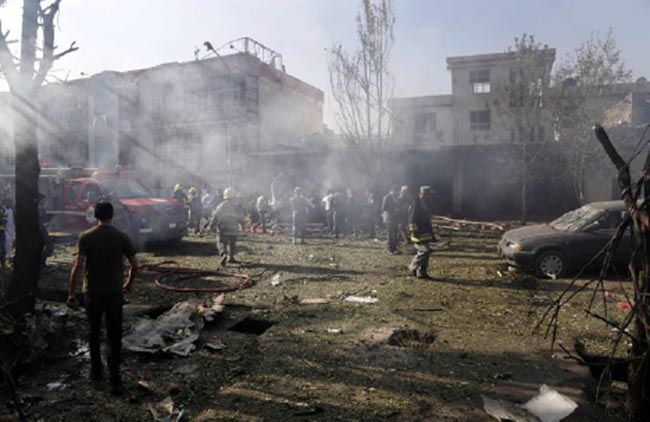The carnage and violence occur frequently around the world despite the public concern. The voices of human rights activists in advocating the rights of individuals fall on deaf ears and all warring parties, including governments and anti-government groups, violate the fundamental rights of people flagrantly. The blood of soldiers and civilians oozes every second and all murderers deem themselves right.
Although we are at the end of 2017, it is believed to be one of the deadliest years in many parts of the world, including Afghanistan. Scores of men, women, and children have been killed in one way or another. The war and militancy took their highest toll on human societies and inflicted heavy casualties upon nations. Although the self-styled Islamic State of Iraq and the Levant (ISIL) lost its ground in Syria and Iraq, it carried out large-scale attacks and people sustained casualties from Kabul to Baghdad, Mogadishu, Manchester, Barcelona, etc. in 2017.
Afghans have also left a bloody year behind as the Taliban and ISIL group intensified their attacks in 2017. In a massacre in Kandahar Province, the Taliban nearly wiped out an entire army unit of 60 men. In April, insurgents drove into the army’s headquarters in the northern province of Balkh and killed at least 140 soldiers in a rampage that lasted several hours. In a March attack claimed by the ISIL group, militants barged into the military’s main hospital in Kabul, slaughtering dozens of soldiers who were being treated there. The fatalities of civilians are not countable. According to a report released by the UN Assistance Mission in Afghanistan (UNAMA), 1,662 civilians were killed and more than 3,500 wounded with deaths in the capital Kabul accounting for nearly 20 per cent of the toll in the first half of 2017. The majority of the victims were killed by anti-government forces, including the resurgent Taliban and in attacks claimed by self-styled Islamic State (IS) group, the report said. The UN’s special envoy to Afghanistan Tadamichi Yamamoto said the human cost of the conflict remains “far too high”. The Thursday’s bloody attack in Kabul, which killed more than 50 people and wounded at least 84, was also extremely shocking and reflects a spike in terrorist activities in the country. Thursday’s attack, claimed by ISIL, shows that this group is able to carry out large-scale attacks in Kabul.
The Yemen conflict, which erupted in 2014, has killed more than 10,000 people and wounded more than 40,000, according to the UN. Last week, the Saudi-led military coalition airstrikes reportedly killed at least 71 civilians, including women and children, within two days. The Houthi-run Saba news agency reported that at least 48 civilians, including 11 children, were killed in 51 air strikes across Yemen on Sunday. Saba also reported that scores of people were wounded after four air strikes targeted a public protest in Arhab district against US President Donald Trump’s decision to recognize Jerusalem as the capital of Israel.
The Rohingya Muslims also suffered severely in 2017. Their rights and dignity were violated by Rohingya security forces on the grounds of their race, color, and creed. Few months back, the UN estimated more than 90,000 Rohingya Muslims were forced to flee their homes since the start of the crackdown. A UN report in February said the campaign against the Rohingya, who were stripped of their citizenship in 1982, “very likely” amounted to war crimes.
To one’s unmitigated chagrin, 2017 was recorded the most violent year in Mexico as at least 23,000 people were reportedly killed – on average one was killed every 20 minutes. This death toll is unprecedented in Mexico since the country has been recording murder for two decades. Corruption, lack of law enforcement and violent drug cartels are said to be the main reasons behind the homicide.
Considering the bloody episodes in different parts of the world, 2017 was highly catastrophic and people’s fundamental rights were violated, especially on the basis of their racial and religious backgrounds. Atrocities and cruel practices are widespread.
Observing human rights and humanitarian law is an obligation on all parties. Perhaps, militant fighters do not deem themselves committed to international instruments, but the states involved in conflicts do have to practice upon international principles. Those states which trample upon humanitarian law and target people indiscriminately have to encounter global sanctions. The international community must not close its eyes to the persistent violence and carnage.
It is the end of 2017, but human catastrophes are unlikely to come to an end. No parties involved in regional conflicts and terrorist activities show tendency in stopping violence. If people continue to lose their lives as a result of unmitigated war and violence, the world will lose their trust in international principles and discussing human rights and dignity will be bombastic. So, international instruments will carry no weight for the public.
Home » Opinion » 2017 – A Deadly Year for the World
2017 – A Deadly Year for the World
| Hujjatullah Zia

